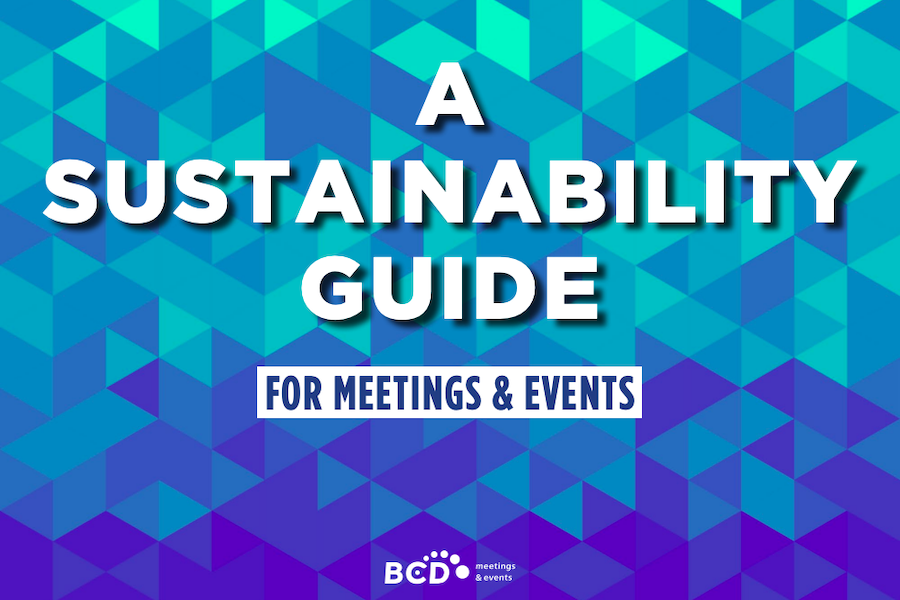Taking a step back from in-person events has enabled greater awareness of the possibilities to increase sustainability in events going forward, according to global agency BCD M&E in its recently published Sustainability Guide for Meetings & Events.
The report said that there is no such thing as a small step, and outlined the following 12 considerations for where to start with sustainable event planning, across a number of areas, including food waste and partnerships…
Planning sustainably across the event lifecycle
CHOOSE PARTNERS WISELY
Event stakeholders have an opportunity to make an impact and influence green and sustainable practices across the entire attendee journey. From sourcing venues and hotels with strong green initiatives to planning activities that minimise their carbon footprint, there are strategies we can all adopt to reduce an event impact.
THINK LOCAL
People don’t want to celebrate their successes or meet with their attendees at the cost of the planet. Today’s travellers and business owners are increasingly looking for accommodations and attractions that limit their impact on the environment and make a positive difference for local communities.
SET SUSTAINABILITY GOALS
Set up in 2015 by the United Nations General Assembly as part of The 2030 Agenda for Sustainable Development, the 17 Sustainable Development Goals serve as a blueprint to achieve a better and more sustainable future for all. Turn to this roadmap for insights and considerations to set your own sustainability goals as you source, travel, plan, staff, design and execute events around the world.
Preventing food waste
HAVE A GAME PLAN
According to industry research, about a third of event professionals admit to throwing away 15-20 percent of food at meetings and events. When planning, increase awareness of food waste among all participants of the event and carefully plan menus and portions to avoid creating waste at all. In the case where waste is created, implement a system that provides methods for managing it in the most sustainable way possible (e.g., composting or donation).
LEVERAGE LOCAL RESOURCES
Be thoughtful about planning your menus. You can help reduce CO2 emissions and waste by sourcing locally from sustainable vendors and suppliers where possible and designing menus with correct portions for each guest.
PLAN FOR LEFTOVERS
Understand the rules of efficient food management including its proper disposal and donation options for surpluses. Look to partner with charities, food banks and innovative companies designed to sustainably process leftovers.
Sustainable meeting planning
GET ATTENDEES INVOLVED
It’s beneficial to provide attendees with insights on how they can reduce their impact as individuals. Encouraging sustainable practices like using public transit, considering vegetarian meal options, being mindful of water usage in hotels, and opting out of daily hotel laundry services are small steps that can make big collective differences.
CONSIDER USING A CARBON EMISSIONS CALCULATOR
Carbon Emissions Calculators are excellent tools for getting an accurate view of the environmental impact of an event. These tools allow you to see the impact of different choices in the planning process. From the type of travel used getting to an event, to an event type itself. Understanding an event’s potential impact is crucial to planning greener meetings.
BE INTENTIONAL ABOUT INVITATIONS
One item that can positively impact all three sustainability concern areas is carefully crafting invitation lists for meetings. Only invite those truly necessary and consider a virtual attendance option for those that do not need to be in person. This reduces CO2, food waste, and paper/plastic usage, and has the potential to reduce costs as well.
Partnering Responsibly
BE INTENTIONAL ABOUT PARTNERSHIPS
Sustainability goes beyond eliminating plastic water bottles and straws. Creating systemic, sustainable change within this industry requires buy-in from other players in the ecosystem, including industry suppliers and partners. Vet potential partners’ commitments to sustainability and choose suppliers whose sustainability goals align with those of your event.
WEAVE SUSTAINABILITY INTO NEGOTIATING CONTRACTING
You can negotiate more than hotel rates and dates for venues in your contracts. Food donation, purchasing local, composting and post-event reporting are among a larger list of negotiable items. After negotiating with your suppliers about sustainability terms, make sure they are in your contract as well. Having a contractual obligation reduces the potential for lack of follow-through on greener initiatives.
MEASURE YOUR SUCCESS
Ask your vendors, suppliers and partners to provide post-event data on sustainable initiatives as outlined in the contract. Then, meet with them to debrief, measure your results, and talk through what worked and what needs improvement. Use those insights to improve sustainability in your next meeting or event.

